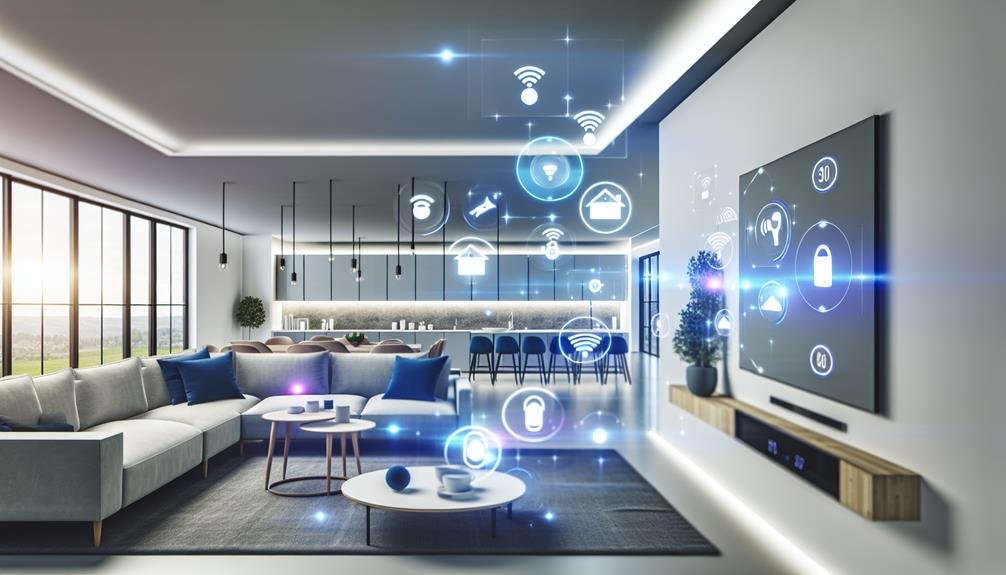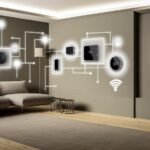Imagine coming home after a long day at work, and with just a simple voice command, your lights turn on, your thermostat adjusts to the perfect temperature, and your favorite music starts playing in the background. Sounds like something out of a futuristic movie, right?
Well, with smart home automation for renters, this kind of convenience is not just a distant dream. In fact, it's becoming increasingly accessible and affordable. But before you dive into the world of smart home automation, there are a few key things you need to know.
From essential devices to security concerns, and even future-proofing your rental, this discussion will cover all the important aspects to consider. So, let's get started and unlock the potential of smart home automation for renters.
Key Takeaways
- Smart home automation offers numerous benefits for renters, including enhanced living experience, cost savings, and convenience.
- Essential devices for a smart rental include a smart hub, smart thermostats, smart lighting, smart locks, and smart plugs.
- When setting up smart home automation in a rental, it is important to communicate with the landlord, prioritize privacy and security, and choose portable devices.
- Security concerns with smart home automation can be addressed by securing the Wi-Fi network, enabling two-factor authentication, and regularly updating devices and software.
Benefits of Smart Home Automation for Renters
There are numerous benefits to incorporating smart home automation into your rental property. By utilizing cost-effective options that improve energy efficiency, you can enhance your living experience while saving money.
Smart home automation allows you to have control over various aspects of your rental property, such as lighting, temperature, and security. With the ability to remotely control these features through your smartphone or voice commands, you have the freedom to adjust settings even when you aren't at home. This convenience not only makes your life easier but also provides you with peace of mind.
One of the significant advantages of smart home automation is its cost-effective options. By optimizing energy usage, you can reduce your utility bills. For example, smart thermostats can learn your preferences and automatically adjust the temperature to maximize energy efficiency. You can also schedule devices to turn off when not in use, eliminating unnecessary energy consumption. These small changes can add up to significant savings over time.
Moreover, smart home automation promotes energy efficiency by monitoring your energy usage and providing insights on how to improve it. With real-time data and analytics, you can make informed decisions about your energy consumption and identify areas where you can make further improvements. By reducing your environmental footprint, you can contribute to a more sustainable future.
Incorporating smart home automation into your rental property not only gives you control and convenience but also offers cost-effective options and promotes energy efficiency. By embracing this technology, you can enjoy the freedom to customize and optimize your living space while saving money and reducing your environmental impact.
Essential Devices for a Smart Rental
To create a smart rental, you'll need to invest in essential devices that can automate various aspects of your living space. Fortunately, there are plenty of wireless solutions and cost-effective options available in the market today.
First and foremost, a smart hub is an essential device that acts as the central control unit for all your smart devices. It allows you to manage and control everything from one central location, making it easier to automate your rental.
Next, smart thermostats are a must-have for any smart rental. These devices can learn your temperature preferences and adjust accordingly, helping you save energy and reduce utility bills. With wireless connectivity, you can control the temperature from anywhere using your smartphone.
Smart lighting is another essential device that can transform your rental into a smart home. With smart bulbs and switches, you can automate your lighting, set schedules, and even change the ambiance with different colors.
For added security, smart locks are a great investment. These devices allow you to lock and unlock your rental remotely, providing convenience and peace of mind.
Lastly, smart plugs are cost-effective options that can turn any regular appliance into a smart one. With wireless connectivity, you can control the power supply to your devices, saving energy and reducing costs.
Tips for Setting Up Smart Home Automation in a Rental
When setting up smart home automation in a rental, follow these tips for a seamless and convenient experience. Renters often desire the freedom to customize their living spaces, even if it's just for a temporary period. With smart home automation, you can transform your rental property into a modern and efficient space without making permanent changes. Here are some essential tips to consider when setting up smart home automation in a rental:
| Tips for Setting Up Smart Home Automation in a Rental |
|---|
| 1. Communicate with your landlord: Before installing any smart devices, consult with your landlord to ensure it's allowed and won't violate your lease agreement. |
| 2. Choose portable devices: Opt for devices that are easy to install and remove without causing any damage to the property. Wireless solutions like smart plugs, bulbs, and cameras are great options. |
| 3. Use smart hubs: Invest in a smart hub that can control multiple devices through a single app. This will simplify the setup process and make managing your smart home a breeze. |
| 4. Prioritize privacy and security: Protect your personal data by using devices with robust security features. Change default passwords, enable two-factor authentication, and keep your devices updated with the latest firmware. |
| 5. Consider smart locks: Enhance your rental property's security with smart locks that provide keyless entry. Just make sure to check with your landlord first to ensure it's allowed. |
Addressing Security Concerns With Smart Home Automation
To address security concerns with smart home automation, take proactive steps to protect your devices and data. Here are some tips to ensure the security of your smart home automation system and protect your rental property:
- Secure your Wi-Fi network: Set a strong password for your Wi-Fi network to prevent unauthorized access to your devices and data. Regularly update your router's firmware to patch any security vulnerabilities.
- Enable two-factor authentication: Enable two-factor authentication for all your smart home devices and applications. This adds an extra layer of security by requiring a verification code in addition to your password.
- Regularly update your devices: Keep your smart home devices up to date with the latest firmware and software updates. Manufacturers often release updates to fix security vulnerabilities and improve overall performance.
Future-proofing Your Rental: Considerations for Smart Home Automation
Consider various factors when future-proofing your rental property with smart home automation. As a renter, it's important to take into account the restrictions set by your landlord or property management. Before investing in any smart home automation devices, make sure they're allowed within your rental agreement.
Look for cost-effective solutions that can enhance your living experience without breaking the bank. For example, consider smart plugs that can turn regular appliances into smart ones, or wireless smart bulbs that can be easily installed and removed. These options allow you to enjoy the benefits of home automation without making permanent changes to the property.
Additionally, choose devices that are compatible with multiple platforms and systems to ensure flexibility and compatibility with future technologies. Opt for devices that can be controlled via Wi-Fi or Bluetooth, as they offer convenient and hassle-free control options.






